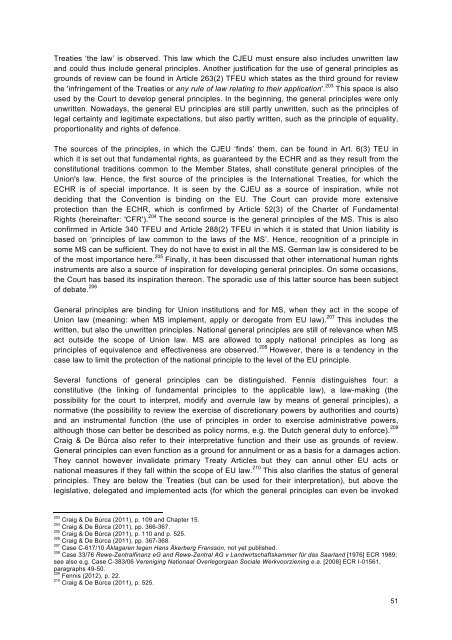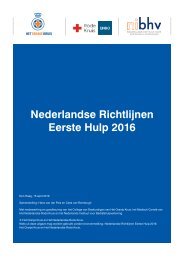Thesis-Anne-Vos-Masters-SBR-and-EU-Law-3
Thesis-Anne-Vos-Masters-SBR-and-EU-Law-3
Thesis-Anne-Vos-Masters-SBR-and-EU-Law-3
You also want an ePaper? Increase the reach of your titles
YUMPU automatically turns print PDFs into web optimized ePapers that Google loves.
Treaties ‘the law’ is observed. This law which the CJ<strong>EU</strong> must ensure also includes unwritten law<br />
<strong>and</strong> could thus include general principles. Another justification for the use of general principles as<br />
grounds of review can be found in Article 263(2) TF<strong>EU</strong> which states as the third ground for review<br />
the 'infringement of the Treaties or any rule of law relating to their application'. 203 This space is also<br />
used by the Court to develop general principles. In the beginning, the general principles were only<br />
unwritten. Nowadays, the general <strong>EU</strong> principles are still partly unwritten, such as the principles of<br />
legal certainty <strong>and</strong> legitimate expectations, but also partly written, such as the principle of equality,<br />
proportionality <strong>and</strong> rights of defence.<br />
The sources of the principles, in which the CJ<strong>EU</strong> ‘finds’ them, can be found in Art. 6(3) T<strong>EU</strong> in<br />
which it is set out that fundamental rights, as guaranteed by the ECHR <strong>and</strong> as they result from the<br />
constitutional traditions common to the Member States, shall constitute general principles of the<br />
Union's law. Hence, the first source of the principles is the International Treaties, for which the<br />
ECHR is of special importance. It is seen by the CJ<strong>EU</strong> as a source of inspiration, while not<br />
deciding that the Convention is binding on the <strong>EU</strong>. The Court can provide more extensive<br />
protection than the ECHR, which is confirmed by Article 52(3) of the Charter of Fundamental<br />
Rights (hereinafter: 'CFR'). 204 The second source is the general principles of the MS. This is also<br />
confirmed in Article 340 TF<strong>EU</strong> <strong>and</strong> Article 288(2) TF<strong>EU</strong> in which it is stated that Union liability is<br />
based on ‘principles of law common to the laws of the MS’. Hence, recognition of a principle in<br />
some MS can be sufficient. They do not have to exist in all the MS. German law is considered to be<br />
of the most importance here. 205 Finally, it has been discussed that other international human rights<br />
instruments are also a source of inspiration for developing general principles. On some occasions,<br />
the Court has based its inspiration thereon. The sporadic use of this latter source has been subject<br />
of debate. 206<br />
General principles are binding for Union institutions <strong>and</strong> for MS, when they act in the scope of<br />
Union law (meaning: when MS implement, apply or derogate from <strong>EU</strong> law). 207 This includes the<br />
written, but also the unwritten principles. National general principles are still of relevance when MS<br />
act outside the scope of Union law. MS are allowed to apply national principles as long as<br />
principles of equivalence <strong>and</strong> effectiveness are observed. 208 However, there is a tendency in the<br />
case law to limit the protection of the national principle to the level of the <strong>EU</strong> principle.<br />
Several functions of general principles can be distinguished. Fennis distinguishes four: a<br />
constitutive (the linking of fundamental principles to the applicable law), a law-making (the<br />
possibility for the court to interpret, modify <strong>and</strong> overrule law by means of general principles), a<br />
normative (the possibility to review the exercise of discretionary powers by authorities <strong>and</strong> courts)<br />
<strong>and</strong> an instrumental function (the use of principles in order to exercise administrative powers,<br />
although those can better be described as policy norms, e.g. the Dutch general duty to enforce). 209<br />
Craig & De Búrca also refer to their interpretative function <strong>and</strong> their use as grounds of review.<br />
General principles can even function as a ground for annulment or as a basis for a damages action.<br />
They cannot however invalidate primary Treaty Articles but they can annul other <strong>EU</strong> acts or<br />
national measures if they fall within the scope of <strong>EU</strong> law. 210 This also clarifies the status of general<br />
principles. They are below the Treaties (but can be used for their interpretation), but above the<br />
legislative, delegated <strong>and</strong> implemented acts (for which the general principles can even be invoked<br />
203<br />
Craig & De Búrca (2011), p. 109 <strong>and</strong> Chapter 15.<br />
204<br />
Craig & De Búrca (2011), pp. 366-367.<br />
205<br />
Craig & De Búrca (2011), p. 110 <strong>and</strong> p. 525.<br />
206<br />
Craig & De Búrca (2011), pp. 367-368.<br />
207<br />
Case C-617/10 Åklagaren tegen Hans Åkerberg Fransson, not yet published.<br />
208<br />
Case 33/76 Rewe-Zentralfinanz eG <strong>and</strong> Rewe-Zentral AG v L<strong>and</strong>wirtschaftskammer für das Saarl<strong>and</strong> [1976] ECR 1989;<br />
see also e.g. Case C-383/06 Vereniging Nationaal Overlegorgaan Sociale Werkvoorziening e.a. [2008] ECR I-01561,<br />
paragraphs 49-50.<br />
209<br />
Fennis (2012), p. 22.<br />
210<br />
Craig & De Búrca (2011), p. 525.<br />
51



